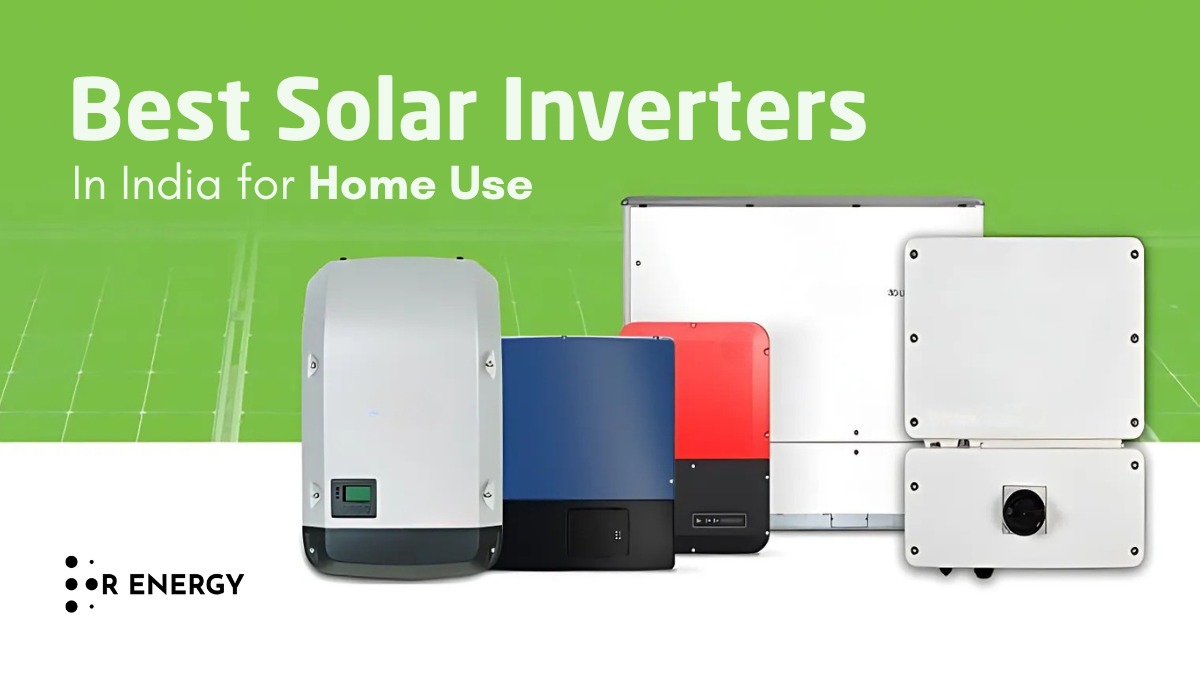
In 2025, with energy bills rising and load-shedding still an issue in many areas, homeowners are increasingly turning to solar inverters as a smart investment in renewable energy. Choosing the best solar inverter in India isn’t just about price—it’s about efficiency, durability, and long-term savings.
What Is a Solar Inverter and Why Is It Important?
A solar inverter is the device that converts direct current (DC) generated by your solar panels into alternating current (AC) that powers your home appliances. It’s like the translator between the sun and your fridge, TV, or Wi-Fi router.
Without a high-quality inverter, even the most expensive solar panels won’t be able to deliver the power you need. In short, your solar setup is only as good as your inverter.
Types of Solar Inverters
String Inverters
These are the most common in Indian homes. They connect multiple panels into a “string” and are cost-effective but may reduce efficiency if one panel underperforms.
Micro Inverters
Installed behind each panel, these work independently and provide better performance, especially in shady conditions, but are more expensive.
Hybrid Inverters
These allow both solar and grid or battery input, making them a flexible choice for backup power. Perfect for areas with frequent power cuts.
How Solar Inverters Work in a Home Solar System
Solar panels generate electricity in DC, but our homes use AC. The inverter acts as the brain of your solar system, managing energy flow from the panels to your home or battery, and sometimes even feeding excess energy back to the grid.
Modern inverters also come with MPPT (Maximum Power Point Tracking) to ensure the highest possible efficiency from your solar panels.
Factors to Consider Before Buying a Solar Inverter
Power Capacity
Make sure your inverter supports your energy needs. A typical Indian home needs a 1kVA to 3kVA inverter.
Battery Compatibility
Choose an inverter that supports lithium-ion or tubular batteries for better longevity.
Warranty & After-Sales Support
Brands offering at least a 2–5 year warranty are a safer bet.
Efficiency & MPPT
Look for inverters with over 95% efficiency and MPPT controllers for optimal performance.
Top 7 Best Solar Inverters in India for Home Use 2025
1. Luminous NXG PRO 1800
- Hybrid inverter with solar + battery + grid support
- Best for households up to 1500 sq. ft.
- 24-month warranty and excellent service
2. Microtek Solar Inverter 2kVA
- Affordable and reliable
- Ideal for medium-sized homes
- Has an in-built solar charge controller
3. Sukam Brainy Eco
- India’s first hybrid digital inverter
- Great for areas with frequent outages
- LED display and user-friendly interface
4. Growatt SPF 3000TL
- International brand with high MPPT efficiency
- Excellent for large homes or villas
- Integrated Wi-Fi monitoring
5. V-Guard Smart Pro 1200
- Known for durability and low maintenance
- Compatible with solar and normal batteries
6. UTL Gamma Plus
- Best for Indian climate conditions
- Smart charging feature with mobile app support
7. Livguard Solar Inverter
- Compact, stylish, and energy-efficient
- Excellent for small homes and apartments
Comparison Table of Top Solar Inverters in India 2025
| Inverter Model | Type | Capacity | Warranty | Ideal For |
| Luminous NXG PRO 1800 | Hybrid | 1.8 kVA | 2 Years | Medium Homes |
| Microtek 2kVA | String | 2.0 kVA | 2 Years | Medium Homes |
| Sukam Brainy Eco | Hybrid | 1.5 kVA | 3 Years | Urban & Rural |
| Growatt SPF 3000TL | Hybrid | 3.0 kVA | 5 Years | Villas & Large Homes |
| V-Guard Smart Pro 1200 | String | 1.2 kVA | 2 Years | Apartments |
The best solar inverter for home use in India in 2025 is the Luminous NXG PRO 1800 with its advanced hybrid technology, high efficiency, and compatibility with various solar panels. It’s cost-effective, reliable, and perfect for Indian households shifting to solar.
Best Brands for Solar Inverters in India
The most trusted solar inverter brands in India include Luminous, Sukam, V-Guard, Microtek, UTL, and Livguard. These companies offer strong service networks, wide compatibility, and proven performance in Indian weather conditions.
Benefits of Installing a Solar Inverter at Home
- Slash your electricity bills
- Gain power independence
- Reduce carbon footprint
- Enjoy government subsidies
- Boost property value
Common Mistakes to Avoid When Choosing a Solar Inverter
- Don’t buy based on price alone
- Avoid over/under-sizing your system
- Don’t skip warranty and service coverage
- Don’t ignore efficiency ratings
Installation Tips for Maximum Efficiency
Hire a certified solar installer, check roof orientation, avoid shading, and install proper surge protection. These little details can improve efficiency by 20–30%.
Maintenance Guide for Solar Inverters
- Clean your solar panels every month
- Monitor inverter readings regularly
- Service annually for optimal performance
How to Pair Your Inverter with Solar Panels
Always check voltage compatibility, panel wattage, and battery type. Consider using the same brand for both to avoid configuration issues.
Government Subsidies and Schemes for Solar Inverters
In 2025, MNRE (Ministry of New and Renewable Energy) offers up to 40% subsidy on solar rooftop systems under PM Surya Ghar Yojana, which includes the cost of solar inverters. Apply via your state DISCOM portal or contact an MNRE-approved vendor.
Conclusion
Choosing the best solar inverter in India is a key step toward energy independence and lower bills in 2025. Whether you’re a city dweller or live in rural India, there’s a solar inverter out there to match your needs, your home, and your wallet
Read More: How Much you can Save with Solar Panels in India in 2025